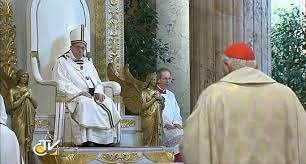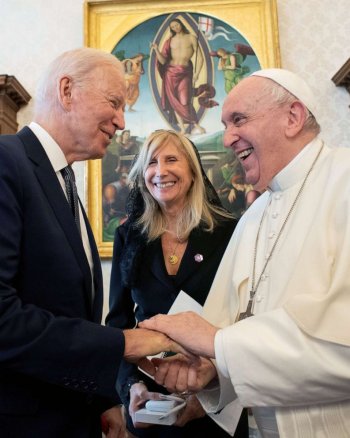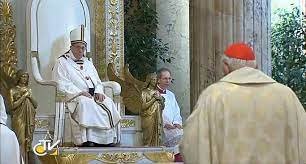Unbiblical and demonstrably FALSE.
Then you don't know what the Bible says. Clearly. There is ample evidence in the New Testament that Peter was first in authority among the apostles. Whenever they were named, Peter headed the list (Matt. 10:1-4, Mark 3:16-19, Luke 6:14-16, Acts 1:13); sometimes the apostles were referred to as “Peter and those who were with him” (Luke 9:32). Peter was the one who generally spoke for the apostles (Matt. 18:21, Mark 8:29, Luke 12:41, John 6:68-69), and he figured in many of the most dramatic scenes (Matt. 14:28-32, 17:24-27; Mark 10:23-28). On Pentecost it was Peter who first preached to the crowds (Acts 2:14-40), and he worked the first healing in the Church age (Acts 3:6-7).
It is Peter’s faith that will strengthen his brethren (Luke 22:32) and Peter is given Christ’s flock to shepherd (John 21:17). An angel was sent to announce the resurrection to Peter (Mark 16:7), and the risen Christ appeared first to Peter (Luke 24:34). He headed the meeting that elected Matthias to replace Judas (Acts 1:13-26), and he received the first converts (Acts 2:41). He inflicted the first punishment (Acts 5:1-11) and excommunicated the first heretic (Acts 8:18-23). He led the first council in Jerusalem (Acts 15) and announced the first dogmatic decision (Acts 15:7-11). It was to Peter that the revelation came that Gentiles were to be baptized and accepted as Christians (Acts 10:46-48).
Peter the Rock
Peter’s preeminent position among the apostles was symbolized at the very beginning of his relationship with
Christ. At their first meeting, Christ told Simon that his name would thereafter be Peter, which translates as “Rock” (John 1:42). The startling thing was that—aside from the single time that Abraham is called a “rock” (Hebrew:
Tsur; Aramaic:
Kepha) in Isaiah 51:1-2—in the Old Testament only God was called a rock. The word rock was not used as a proper name in the ancient world. If you were to turn to a companion and say, “From now on your name is Asparagus,” people would wonder: Why Asparagus? What is the meaning of it? What does it signify? Indeed, why call Simon the fisherman “Rock”?
Christ was not given to meaningless gestures, and neither were the Jews when it came to names. Giving a new name meant that the status of the person was changed, as when Abram’s name was changed to Abraham (Gen.17:5), Jacob’s to Israel (Gen. 32:28), Eliakim’s to Joakim (2 Kgs. 23:34), or the names of the four Hebrew youths—Daniel, Hananiah, Mishael, and Azariah to Belteshazzar, Shadrach, Meshach, and Abednego (Dan. 1:6-7). But no Jew had ever been called “Rock.” The Jews would give other names taken from nature, such as Deborah (“bee,” Gen. 35:8), and Rachel (“ewe,” Gen. 29:16), but never “Rock.” In the New Testament James and John were nicknamed Boanerges, meaning “Sons of Thunder,” by Christ, but that was never regularly used in place of their original names, and it certainly was not given as a new name. But in the case of Simon-bar-Jonah, his new name Kephas (Greek:
Petros) definitely replaced the old.
Promises to Peter
When he first saw Simon, “Jesus looked at him, and said, ‘So you are Simon the son of John? You shall be called Cephas (which means Peter)’” (John 1:42). The word
Cephas is merely the transliteration of the Aramaic
Kepha into Greek. Later, after Peter and the other disciples had been with Christ for some time, they went to Caesarea Philippi, where Peter made his profession of faith: “You are the Christ, the Son of the living God” (Matt. 16:16). Jesus told him that this truth was specially revealed to him, and then he solemnly reiterated: “And I tell you, you are Peter” (Matt. 16:18). To this was added the promise that the Church would be founded, in some way, on Peter (Matt. 16:18).
Then two important things were told the apostle. “Whatever you bind on earth shall be bound in heaven, and whatever you loose on earth shall be loosed in heaven” (Matt. 16:19). Here Peter was singled out for the authority that provides for the forgiveness of sins and the making of disciplinary rules. Later the apostles as a whole would be given similar power [Matt.18:18], but here Peter received it in a special sense.
Peter alone was promised something else also: “I will give you the keys of the kingdom of heaven” (Matt. 16:19). In ancient times, keys were the hallmark of authority. A walled city might have one great gate; and that gate had one great lock, worked by one great key. To be given the key to the city—an honor that exists even today, though its import is lost—meant to be given free access to and authority over the city. The city to which Peter was given the keys was the heavenly city itself. This symbolism for authority is used elsewhere in the Bible (Isa. 22:22, Rev. 1:18).
Finally, after the Resurrection, Jesus appeared to his disciples and asked Peter three times, “Do you love me?” (John 21:15-17). In repentance for his threefold denial, Peter gave a threefold affirmation of love. Then Christ, the Good Shepherd (John 10:11, 14), gave Peter the authority he earlier had promised: “Feed my sheep” (John 21:17). This specifically included the other apostles, since Jesus asked Peter, “Do you love me more than these?” (John 21:15), the word “these” referring to the other apostles who were present (John 21:2). Thus was completed the prediction made just before Jesus and his followers went for the last time to the Mount of Olives.
Immediately before his denials were predicted, Peter was told, “Simon, Simon, behold, Satan demanded to have you, that he might sift you like wheat, but I have prayed for you that your faith may not fail; and when you have turned again [after the denials], strengthen your brethren” (Luke 22:31-32). It was Peter who Christ prayed would have faith that would not fail and that would be a guide for the others; and his prayer, being perfectly efficacious, was sure to be fulfilled.
Who is the rock?
Now take a closer look at the key verse: “You are Peter, and on this rock I will build my Church” (Matt. 16:18). Disputes about this passage have always been related to the meaning of the term “rock.” To whom, or to what, does it refer? Since Simon’s new name of Peter itself means rock, the sentence could be rewritten as: “You are Rock and upon this rock I will build my Church.” The play on words seems obvious, but commentators wishing to avoid what follows from this—namely the establishment of the papacy—have suggested that the word rock could not refer to Peter but must refer to his profession of faith or to Christ.
From the grammatical point of view, the phrase “this rock” must relate back to the closest noun. Peter’s profession of faith (“You are the Christ, the Son of the living God”) is two verses earlier, while his name, a proper noun, is in the immediately preceding clause.
Another alternative
The previous argument also settles the question of whether the word refers to Christ himself, since he is mentioned within the profession of faith. The fact that he is elsewhere, by a different metaphor, called the cornerstone (Eph. 2:20, 1 Pet. 2:4-8) does not disprove that here Peter is the foundation. Christ is naturally the principal and, since he will be returning to heaven, the invisible foundation of the Church that he will establish; but Peter is named by him as the secondary and, because he and his successors will remain on earth, the visible foundation. Peter can be a foundation only because Christ is the cornerstone.
In fact, the New Testament contains five
different metaphors for the foundation of the Church (Matt. 16:18, 1 Cor. 3:11, Eph. 2:20, 1 Pet. 2:5-6, Rev. 21:14). One cannot take a single metaphor from a single passage and use it to twist the plain meaning of other passages. Rather, one must respect and harmonize the different passages, for the Church can be described as having different foundations since the word
foundation can be used in different senses.
Look at the Aramaic
Opponents of the Catholic interpretation of Matthew 16:18 sometimes argue that in the Greek text the name of the apostle is
Petros, while “rock” is rendered as
petra. They claim that the former refers to a small stone, while the latter refers to a massive rock; so, if Peter was meant to be the massive rock, why isn’t his name Petra?
Note that Christ did not speak to the disciples in Greek. He spoke Aramaic, the common language of Palestine at that time. In that language the word for rock is
kepha, which is what Jesus called him in everyday speech (note that in John 1:42 he was told, “You will be called
Cephas“). What Jesus said in Matthew 16:18 was: “You are
Kepha, and upon this
kepha I will build my Church.”
When Matthew’s Gospel was translated from the original Aramaic to Greek, there arose a problem which did not confront the evangelist when he first composed his account of Christ’s life. In Aramaic the word
kepha has the same ending whether it refers to a rock or is used as a man’s name. In Greek, though, the word for rock,
petra, is feminine in gender. The translator could use it for the second appearance of
kepha in the sentence, but not for the first because it would be inappropriate to give a man a feminine name. So he put a masculine ending on it, and hence Peter became Petros.




